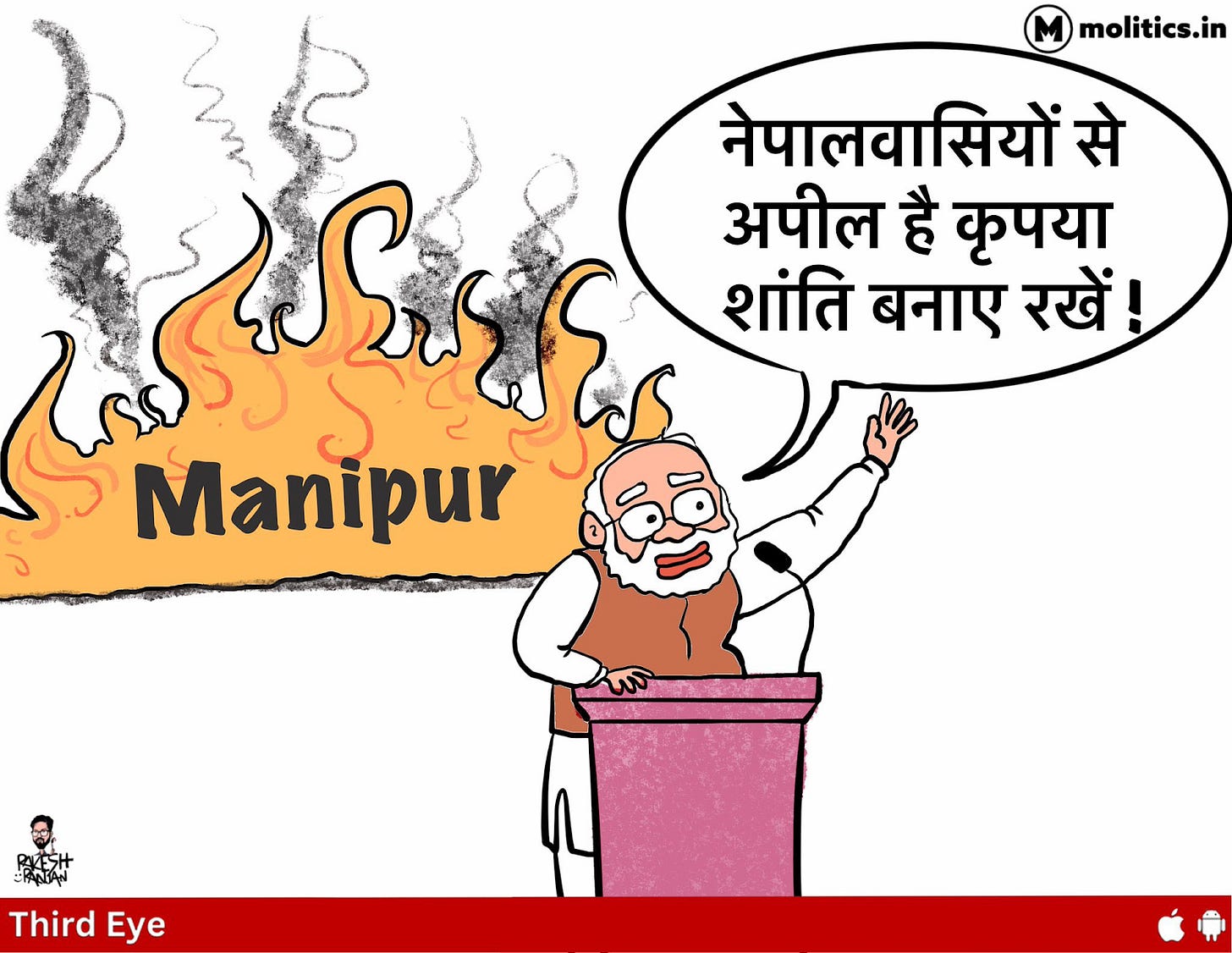SC to Hear Bail Pleas of Umar Khalid and Others on Friday; PM Modi’s First Visit to Manipur on Sept 13 Faces Local Challenges; Many Memoirs of Retired Army Officers are “an Exercise in Spin”
After Two Days of Mayhem, Nepal’s Streets are Quiet, How did Indo-US Trade Talks Get Back on Track, Modi’s Tributes to RSS Chief Mohan Bhagwat are a “Desperate Bid to Curry Favour,” Says Congress
A newsletter from The Wire | Founded by Tanweer Alam, Sidharth Bhatia, Pratik Kanjilal, Seema Chishti, Sushant Singh, MK Venu, and Siddharth Varadarajan | Contributing writer: Kalrav Joshi, with additional inputs by Anirudh SK
Dear readers
If you are already a paid subscriber, thank you! And be sure to renew your subscription when it expires.
If you like our work and want to support us, then do subscribe. Sign up with your email address by clicking on this link and choose the FREE subscription plan. Our newsletter is paywalled but once a week we lift the paywall so newcomers can sample our content.
To take out a fresh paid subscription or to renew your existing monthly or annual subscription, please click on the following link - https://rzp.io/rzp/the-india-cable
Please give us at least up to 2 business days to activate/upgrade/renew your subscription
These are one-time payments and there will be no auto-renewal
Over to Sidharth Bhatia for today’s Cable
Snapshot of the day
September 11, 2025
Sidharth Bhatia
After the Delhi High Court denied bail, the Supreme Court of India is scheduled to hear tomorrow bail pleas of former Jawaharlal Nehru University (JNU) student activists Umar Khalid, Sharjeel Imam and Gulfisha Fatima after failing to get reprieve from the high court in the Unlawful Activities (Prevention) Act (UAPA) case related to the alleged conspiracy behind the February 2020 riots in the national capital. LiveLaw reports that a bench of Justices Aravind Kumar (former Chief Justice of Gujarat High Court) and N V Anjaria (the Gujarat judge who was the compromise candidate selected in Justice Pancholi’s stead) is likely to hear the bail pleas of the activists who have been in custody for five years.
India’s Prime Minister Narendra Modi’s visit to Manipur on September 13, the first since the outbreak of ethnic violence in 2023, is facing significant challenges, with the United Naga Council (UNC) imposing an indefinite “trade embargo” on key highways, and an umbrella body of Meitei insurgent groups calling for a “total shutdown” on the day of his visit, September 13. The UNC’s embargo, which began at midnight on Tuesday, is a direct protest against the Union government’s decision to scrap the Free Movement Regime (FMR) with Myanmar and fence the border. According to a report in The Indian Express talks between Governor Ajay Bhalla and UNC representatives to avert the blockade failed. “They verbally requested us to call off the embargo but we cannot do that,” UNC president Ng Lorho told the newspaper, confirming the embargo would be strictly enforced by volunteers. This new challenge from the Naga community adds another layer of complexity to a visit already framed by the starkly divided reactions of the warring Kuki-Zo and Meitei communities. Meanwhile, sources indicate that Modi is likely to announce a rehabilitation package and meet with representatives of people displaced by the conflict, though he may not visit relief camps directly due to time and security constraints.
While the media has been abuzz with all sorts of misplaced realities, veteran journalist and editor of the Shillong Times, Patricia Mukhim calls out the headline management in Manipur in this sharp piece arguing that “beyond security issues, not much attention has been paid to the development aspect, on which rests much of the anguish. Whether these agreements, which appear only as hard-core, security-centric motives, will actually lead to normalcy in Manipur as hoped for in the editorials, is questionable. The development vacuum in the hills has only exacerbated after the conflict. What sort of institutions will come up in the hills, or will development continue to be valley-centric? Who will pursue this agenda? Any settlement not grounded in justice cannot sustain long-term peace.”
Speaking of agreements, read this piece by Rokibuz Zaman on why the centre's news Suspension of Operations or SoO agreement with Kuki-Zo groups has left Manipur unenthused.
Even as Nepal's streets are more tranquil after Monday and Tuesday's protests, it is unclear what kind of government will take over the reins in Kathmandu, and New Delhi will “have to walk a diplomatic tightrope” given


